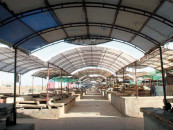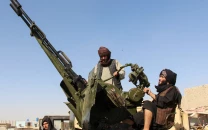Owning problems, and solutions
Cholera, a disease for which there are well-established treatments, has become a recurring calamity in war zones.

Sudan, a country in the midst of a brutal civil war for the last two years, has seen emergence of a deadly cholera outbreak in the last week. More than 50 people died and over a thousand got sick in the southern city of Kosti in just three days. Given the current state of war, the lack of medical supplies and a crumbling health infrastructure, it is all but likely that the deadly disease would spread not just in Sudan but also in neighbouring countries.
Cholera, a disease for which there are well-established treatments, has become a recurring calamity in war zones. Destruction of medical infrastructure, contamination of water systems, limited relief supplies, all contribute to emergence of the disease in communities caught in conflict. Yemen, a country bombarded endlessly in the last decade, became the global epicentre of the disease, one that is still devastating the country.
The emergence of cholera in Sudan comes at a time when, given the executive orders of the new US administration, global health is under retreat, humanitarian efforts have been rolled back and international organisations are laying off thousands of frontline workers. Among my colleagues who have worked for USAID or affiliated groups, there is anger, anxiety and uncertainty. They see their life's worth being evaporated with little clarity for the future. The impact is both professional and personal, and heartbreaking to read.
There is another group of people that I am in touch with. These are colleagues in low and middle income countries who have long been troubled by the way global humanitarian work is practised, the intent to use aid not for care and concern but for "soft power", and for ensuring the status quo of the global order. They are certainly not cheering about the personal loss of colleagues who have worked in the international aid sector, but they have been concerned about the real goal of aid. They have argued for more localisation, more ownership by developing countries and less dependency on aid agencies. These are valid points, but the solutions presented by these colleagues are far from practical. Some are asking for greater public sector spending by the local governments and regional cooperation. But looking at the current landscape, that is hardly a likely solution. For example, if we talk about Pakistan, can we really expect that the government will spend more to strengthen the sectors that were supported by international aid? They should, but would they? Can we imagine a larger tax base? Given the state of politics in the country and the region, what hopes do we have of creating regional institutions that work across boundaries and prioritise real development issues that impact the most vulnerable? In the absence of USAID, are they thinking of self-sufficiency or new donors? Is this likely to change in the near future? Many of us know the answers - these are, of course, rhetorical questions.
This takes me back to the situation in Sudan. How to help people in the current moment? One way to think about it is that we simply do nothing. We say, "not our problem" and move on. We have been doing it forever and that is no different than what is happening in the corridors of power in countries all across the globe. The second option is more complicated, but one worth pursuing if we truly care. This option starts with recognition that lives in Sudan, or Yemen, or any other part of the world, matter, and matter a lot, and that we share a sense of responsibility towards them and everyone around us. That option also requires coordination, personal and financial support, and a relentless pursuit to generate awareness, arguing for care and kindness, and making a case for what it means to be human. There are individuals who are doing that in newspapers and in classrooms, in community centres and in centres of worship. We can support them in their pursuits.
This approach also rests on hope - hope that there is still ample kindness out there, and that a large number of people are caring and decent. I am clinging on that hope.















COMMENTS
Comments are moderated and generally will be posted if they are on-topic and not abusive.
For more information, please see our Comments FAQ